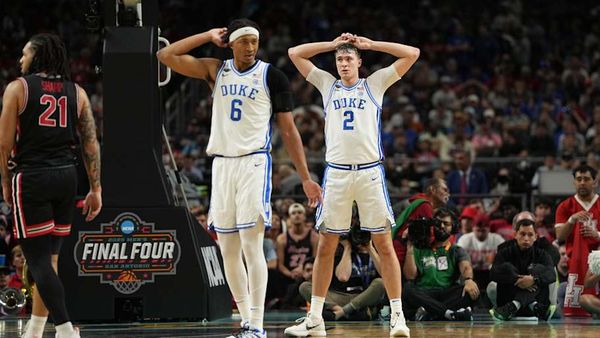When it comes to shaggy dog sports movies of the late 20th century, few did it better than Ron Shelton. As a writer and director, he understood the appeal of semi-ridiculous, semi-charming men past their prime looking for one last shot at greatness — or at least a half-baked redemption. Sandwiched between the soulful minor league romance of “Bull Durham” and dusty pro golfing dreams of “Tin Cup,” Shelton turned to the high-spirited pickup basketballs games of Los Angeles for 1992′s “White Men Can’t Jump,” a buddy film starring Woody Harrelson and Wesley Snipes as an unlikely pair who team up to hustle any takers.
But “White Men Can’t Jump” no longer exists to be fondly remembered and rewatched, but as a library title to be reimagined. Shelton is credited as a co-writer here with Kenya Barris and Doug Hall, and that should be the good news. But like so much else that Hollywood endlessly recycles, the question hovering around the edges of the movie is simply: Why?
The original is on Hulu. The new version is on Hulu. All things being equal, what would compel audiences to watch the remake?
Stepping into Harrelson and Snipes’ basketball shoes are Jack Harlow and Sinqua Walls, and they have a nice, unforced chemistry together. But they’re stuck inside a movie that lacks shape and propulsion — and the effervescent presence of Rosie Perez and her “Jeopardy!” ambitions — but adds a back story about thwarted potential.
In the first movie, basketball was just a means to an end: Fast cash. Now it’s that plus something more.
Better known for his music career, this is Harlow’s first major role as an actor. He plays a one-time college player named Jeremy, whose dreams died with his two bum knees. Now he’s scrapping by selling detox potions and coaching one-on-one. He’s one of those white guys who tries too hard around Black people — this feels like Barris’ influence on the script; it’s a style of joke he’s returned to often across his projects — but Harlow has a looseness that works. He’s a goof who believes in the power of meditation (when he’s not popping pain pills, a detail that is introduced and then mostly abandoned) and he strolls onto the basketball court wearing Birkenstocks and socks and looking out of place. But he can still hit a three pointer.
Harlow has the benefit of a far more seasoned scene partner in Walls, playing a top high school prospect named Kamal who flamed out after decking a heckler at a game. Ten years later, he’s married with a kid and keeping his head down, working as a package delivery driver. He’s stoic for the most part, except when he rings a doorbell and the homeowner says “Don’t I know you?” and all that repressed bile about his nonexistent basketball career comes back up. Walls brings a sense of melancholy to the role and instead of the brash, cocky guy of the original, he’s skeptical and contemplative and bruised. That gives things a slightly more serious subtext.
Walls has real chops (memorably as Don Cornelius in the “Soul Train” biopic series) but here he’s playing a character sapped of the kind of over-the-top personality that might give the film a stronger comic energy. (Calmatic is the director, who also helmed this year’s “House Party” remake).
Kamal and Jeremy are both in need of fast money, but their pickup game hustle is missing that loose-limbed combination of con-artistry and joke-filled, testosterone-fueled posturing. This should be more fun.
Maybe it’s not fair to compare the two movies, but it’s instructive because the changes don’t deepen or improve the story so much as rob it of what made it interesting in the first place. Harrelson played a mostly likable mess of a man who was his own worst enemy; Snipes played a fast-talking, street savvy type who wasn’t above hustling his own partner. But here, Harlow is closer to the human embodiment of a golden retriever looking for a home, while Walls is saddled with character beats that amount to rolling his eyes at his partner’s weirdo antics.
Even the trash talking is minimal and flat.
In other words, everything feels cleaner. No betrayals. No massive debts owed to scary guys. No real banter. And the women are barely more than plot points, although Teyana Taylor does a lot with the little she’s given as Kamal’s wife. Lance Reddick, who died in March, shows up briefly as Kamal’s father and it’s bittersweet to see him in one of his last roles.
Despite it all, the movie mostly hangs together, even if it lacks some of the visual punch of the original, which shot exclusively at outdoor courts. Too many of the early scenes here take place in dimly lit indoor gyms that give off a claustrophobic feel, although the twosome do eventually play at Watts and Venice Beach, locations also featured in the first film.
But at its core, this isn’t a story about two hustlers. Deep down, both Kamal and Jeremy still pine for the NBA. A truer, more shambolic story would have spent time sorting out why that’s such a pipe dream now that they’re in their late 20s. Instead, in the end the movie chooses fantasy.
Hoop dreams, indeed.
———
'WHITE MEN CAN’T JUMP'
2 stars (out of 4)
MPA rating: R (for pervasive language and some drug material)
Running time: 1:41
How to watch: Hulu
———







